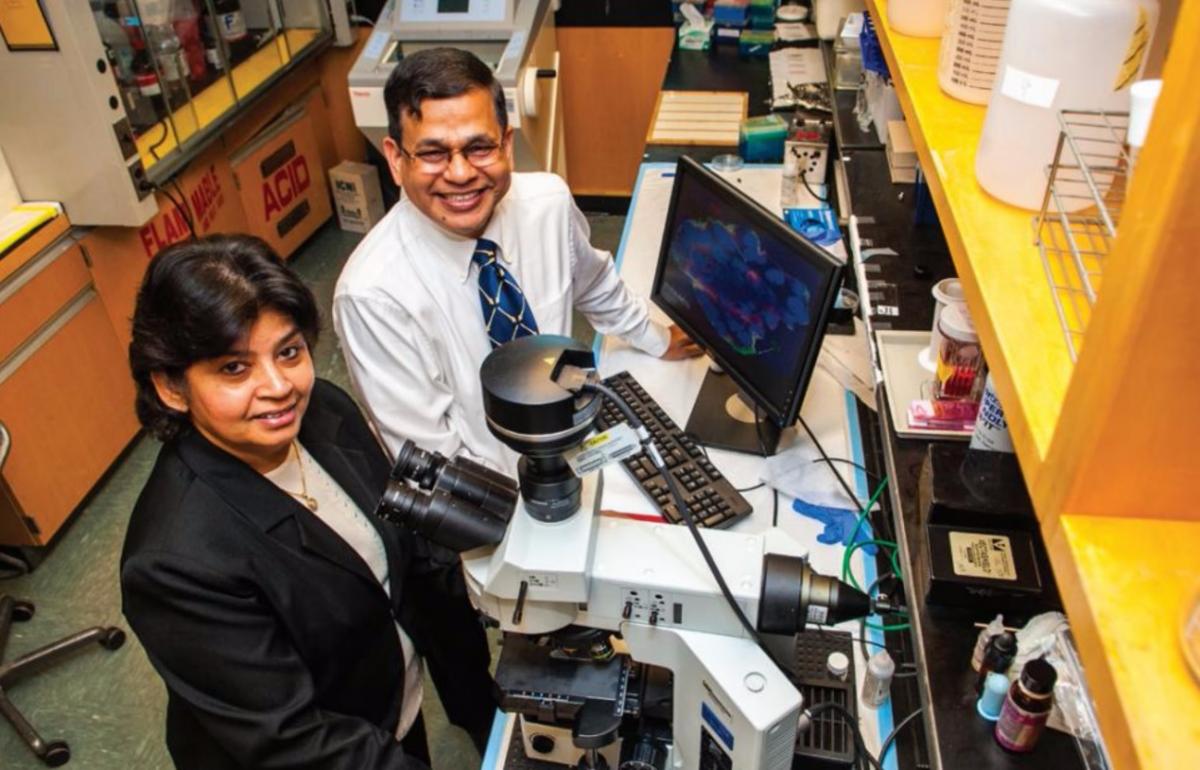
USF startup receives $1.49 million to advance its novel cancer stem cell inhibitor technology
Transgenex was founded in 2012 by USF professors Shyam Mohapatra and Subhra Mohapatra. Shyam Mohapatra is a distinguished professor of health and director of USF’s Center for Research and Education of Nanobioengineering. Subhra Mohapatra is an associate professor at USF’s Department of Molecular Medicine. (Photo: USF Magazine.)
TAMPA, Fla. – Transgenex Nanobiotech, Inc., a University of South Florida spinout company, has been awarded a $1.49 million Phase II Small Business Innovation Research (SBIR) Award from the National Cancer Institute. The contract will help fund further development of the company’s novel cancer stem cell inhibitor, TN-1008.
Traditional cancer therapies often cannot completely eradicate tumors, prevent cancer recurrence or metastasis in lung cancer patients. Some of these failures can be attributed to cancer stem cells (CSCs), which have the property of self-renewal and are responsible for cancer drug resistance and cancer relapse. TGN is developing novel therapeutic agents that target CSCs, specifically agents that target these CSCs.
TGN discovered the novel CSC inhibitor TN-1008 prior to a Phase 1 SBIR contract, and will use the newly awarded Phase II contract to conduct studies for FDA regulatory approvals for this compound. The end goal is to lead to a new drug that will target stem cells of lung and other cancers.
“We are so pleased to receive this new award to further develop our compound and to evaluate the effectiveness in a mouse model of lung cancer,” said Dr. Subhra Mohapatra, a USF associate professor in the Department of Molecular Medicine and the lead investigator in the study. “The support of the SBIR contract will bring us one step closer to improving the survival and quality of life for cancer patients.”
In an effort to dramatically lessen the impact of cancer, the grant programs are the National Cancer Institute’s engine of innovation for developing and commercializing new technologies and products to prevent, diagnose and treat cancer. The SBIR and STTR Programs were created by Congress to strengthen the role of small, innovative companies in federally supported research and development.
“Having a grant program like this enables startups like Transgenex to continue essential research and development in order to move technologies out of the laboratory and into the marketplace,” said Valerie Landrio McDevitt, USF’s associate vice president for technology transfer and business partnerships.
Transgenex Nanobiotech is engaged in the discovery and development of drugs for the treatment of acute and chronic lung diseases and cancers through formulations and nano-encapsulation methods. The company has received more than $4.5 million in SBIR/STTR funds and was the recipient of the Tampa Bay Technology Forum's Innovation of the Year Award in 2015.
For more information about Transgenex Nanobiotech, visit: http://www.transgenex.com.
About Transgenex Nanobiotech, Inc.
Transgenex Nanobiotech, Inc., is a privately held nano-biotechnology company that engages in the discovery and development of nanoparticle formulations and nano-encapsulation methods for the treatment of cancers. Located in Tampa, FL the company is a spinout from the University of South Florida, with a strong patent position, developed by the founders and licensed from the University of South Florida.
About the NCI SBIR & STTR
The Small Business Innovation Research (SBIR) and Small Business Technology Transfer (STTR) Programs are NCI's engine of innovation for developing and commercializing novel technologies and products to prevent, diagnose, and treat cancer. Small businesses are a national resource for technological innovation and a mainstay of the economy. The SBIR & STTR Programs were created by Congress to strengthen the role of small, innovative companies in federally supported research and development.
About the University of South Florida
The University of South Florida, established in 1956 and located in Tampa, is a high-impact, global research university dedicated to student success. The USF System includes three, separately accredited institutions: USF; USF St. Petersburg; and USF Sarasota-Manatee. Serving more than 49,000 students, the USF System has an annual budget of $1.6 billion and an annual economic impact of $4.4 billion. USF is ranked in the Top 30 nationally for research expenditures among public universities, according to the National Science Foundation. In 2016, the Florida Legislature designated USF as “Emerging Preeminent,” placing USF in an elite category among the state’s 12 public universities. USF is a member of the American Athletic Conference.